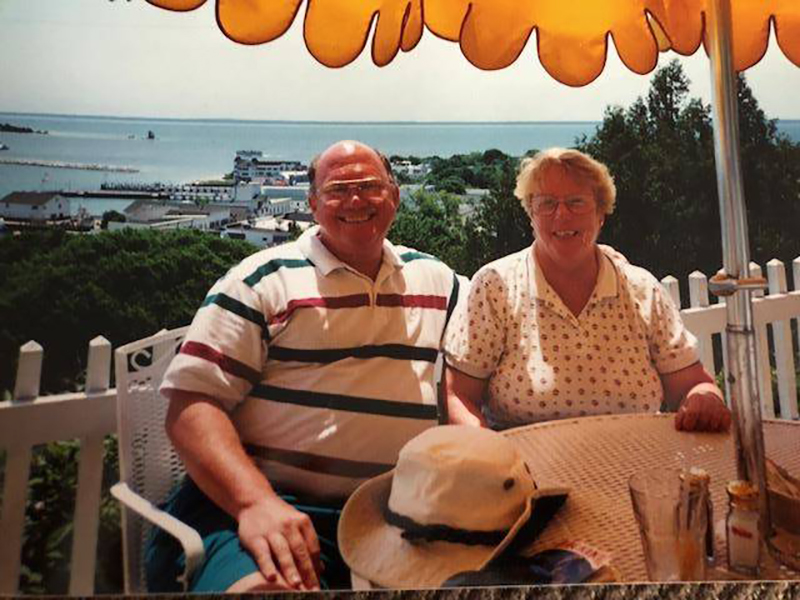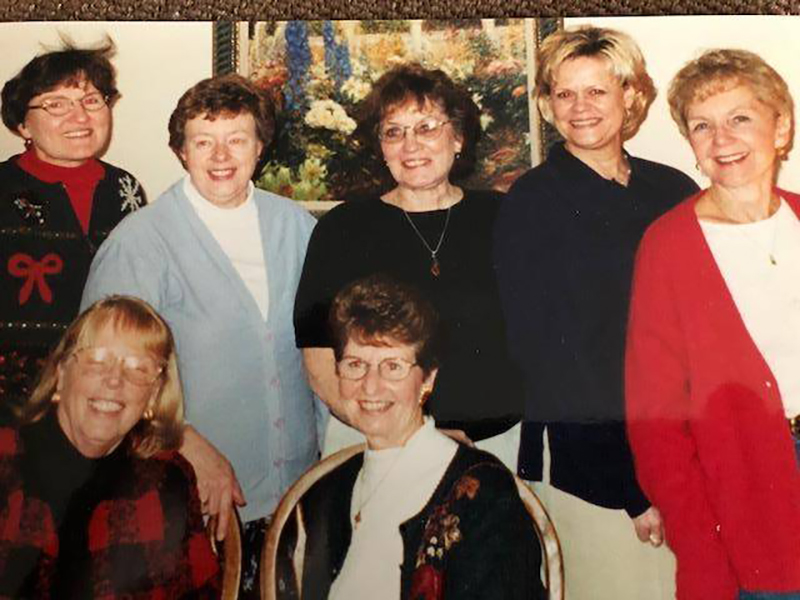

USE MENU ABOVE TO VIEW MORE IN THIS SERIES

Courtesy of Gellersted family.
Susan Gellersted of Hoffman Estates and her late husband, Guy, in a vacation picture taken at Mackinac Island, Michigan, in 1995.
At 6 a.m. April 8, 1996, while the rest of the world was getting up to go to work, preparing lunches for their children or reading the paper, I became a widow and my son, Kurt, lost the man he depended on most for guidance and inspiration.
My husband, Guy, was my college sweetheart, the calm member of the family, the cook and the man who brought music to our lives.
And now he had died of breast cancer at age 53.
"To everything there is a season" from Ecclesiastes 3:1 became my motto as I tried to figure out my new life.
How could I have prepared better for this?
• Family and friends are a necessity. They want to help, and I had to learn to let them. It's humbling to be on the receiving end of their love and generosity. But know that they will help in different ways, and that's OK. Some will be there at the beginning and then move on to someone else's crisis while others are in it for the long haul.
• Watch how others handle loss. My dad was my role model without me even knowing it when Mom died. He sent me home to be with my own family the night of her funeral because he needed to learn to live his new life and I had to get back to mine. Years later, getting my son off to college was way more important to me than keeping him from going on with his life.
• Learn to cook a few quick meals that become automatic to you and visit a grocery store enough to know the general layout of the place. Friends brought us meals for two months, and I will forever be grateful to them.
• Know your basic financial situation and how to write a check and access your accounts. This is one area you can have control over as the rest of your life seems to be spinning out of control.
When Guy and I prepared our wills, I never thought I would actually use it, but I did. When relatives questioned decisions I made, I could always say that Guy wanted it that way.
Because Kurt, as a senior in high school, was old enough, I told him the truth about his dad's condition as it deteriorated. This, for us, was the right decision.
When the final call came to get back to the hospital, it was Kurt who took over driving, etc. But when he got home, I made sure I reminded him that I was still Mom and that together we would figure this out. Eventually.
What has helped me the most over these past 22 years? It falls into two categories: immediate and long-term help.
Within hours of Guy's death, I sat down and wrote out my goals:
• Get Kurt to college in a few months.
• Find out my financial situation.
• Don't go crazy because I am stronger than I think.
I needed to take the time to grieve. I gave myself permission to just sit. But I also gave myself a time limit and then I needed to get up and do something. I considered going to the mailbox as doing "something."
I knew I needed to take care of myself, so I ate better thanks to many friends, got a reasonable amount of sleep, returned to my middle school teaching job with caring peers and students, and, because of some article I read, I never drank alone.
To make myself feel useful, I put myself out there to other people in two ways. First, I wrote an article on male breast cancer, which was published in the Tribune, emphasizing that men do get it and they do sometimes die from it, so get yourself checked out.
And secondly, my friend Doris, also a widow, and I have a talk at our church on what you need to know when your spouse dies. Afterward, we realized that few of the participants thought it might happen to them.
I have found that big events like Christmas or weddings can be planned for and actually enjoyed.
It's the little things that make me shudder. Returning to a favorite restaurant as a single, greeting a new grandson whose grandfather would have loved to have known him or attending Parents Weekend with only one parent are times to take a deep breath and just be aware.
At some point, I found that dating everything from "before Guy died" to "after Guy died" wasn't healthy for me or Kurt.
We needed a new reference point. So we went to China.

Courtesy of Gellersted family.
"The Sisters" became a big part of Susan Gellersted's healing. They are, from top left, Cherie Durfee-Smith, Janice Reingardt, Sharon Kohn, Ruby Yackle and Carol Snelson and, from bottom left, Gellersted and Pat VandeLogt.
But probably the most meaningful day-to-day living help I have received is being a part of The Sisters. Though none of us are members of Willow Creek Church, we seven were each steered there by concerned friends or family.
We were assigned to a group based on type of loss: death of a spouse. We are each very different but share basic beliefs and a common loss.
For 10 weeks, we shared our grief as we talked, laughed and cried, according to our leader Paul's guidelines.
But then our sessions were over, and we didn't want to stop healing. We started meeting monthly for dinner at one of our homes, and 22 years later, we are still meeting monthly to share our ever-changing lives.
New boyfriends and future husbands knew that they needed The Sisters' approval. We've traveled across country to attend our children's weddings, vacationed together, encouraged each other, and always loved and cared for each other.
The Sisters give me a perspective that I can get from no other place.
And then one day, it is time to move on with your life. You've healed as much as you can.
Your son has his own family now and you love his wife. You get to be Grandma and visit your grandson as often as possible. And 15 years ago, a man named Mitch came walking up your driveway, and you realize that life is good.
And the healing continues.

All loss is difficult. But few losses are as devastating or as challenging as the loss of life’s partner. Join us as we explore this unusually personal topic with first-person accounts and through the story of one family's tragic loss.